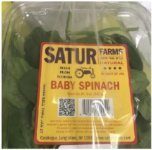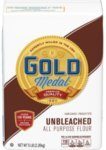The FDA announced that Thrive Market, Inc, recalled all lots of the Thrive Market-branded nut butters (Organic Creamy Almond Butter, Non-GMO Creamy Almond Butter, Organic Crunchy Almond Butter, Non-GMO Crunchy Almond Butter, Organic Crunchy Peanut Butter, Organic Creamy Peanut Butter, Sesame Tahini, Creamy Cashew Butter, Organic Coconut Butter, and Sunflower Butter) due to the potential for contamination with Listeria monocytogenes. On January 21, 2019, one of our suppliers notified FDA that it was issuing a recall of all nut butters it has manufactured since January 2018 because of a positive test for Listeria monocytogenes in recent lots. The Products were distributed nationwide via Thrive Market’s e-commerce subscription service to its members, as well as other online retailers. @ https://www.fda.gov/Safety/Recalls/ucm629819.htm
ruth
Thrive Market, Inc, is recalling all unexpired lots of the Thrive Market-branded nut butters listed below (“Product(s)”) due to the potential for contamination with Listeria monocytogenes. On January 21, 2019, one of our suppliers notified us that it was issuing a recall of all nut butters it has manufactured since January 2018 because of a positive test for Listeria monocytogenes in recent lots. Because the safety of our members is our absolute priority, we are expanding on our supplier’s recall and are voluntarily recalling all unexpired lots of all Thrive Market-branded nut butters manufactured by this supplier.
ruth
The FDA announced that Satur Farms, of Cutchogue, NY 11935 recalled Baby Spinach and Mesclun because it has the potential to be contaminated with Salmonella. The product was distributed in New York and Florida through retail stores. The product was packed in plastic clamshell containers with Satur Farms brand name. There have been no reported illnesses. The voluntary recall is being initiated following routine sampling by the Florida Department of Agriculture and New York State Department of Agriculture and markets. @ https://www.fda.gov/Safety/Recalls/ucm629755.htm
Satur Farms, 3705 Alvah’s Lane, Cutchogue, NY 11935 is voluntarily recalling Baby Spinach and Mesclun with the specific lot numbers listed below because it has the potential to be contaminated with Salmonella, an organism which can cause serious and sometimes fatal infections in young children, frail or elderly people and others with weakened immune systems. Healthy persons infected with Salmonella often experience fever, diarrhea (which may be bloody), nausea, vomiting and abdominal pain.
ruth
Lactalis has recalled again infant formula due to Salmonella. Infant formula made a Spanish factory was linked to a Salmonella outbreak in France. The company recalls 16,300 boxes of Picot AR milk sold exclusively in pharmacies since Nov. 29, 2018. The finding shows that 4 babies (ages 24-10 months) got ill with Salmonella Poona associated with the consumption of the product, with 2 other cases under investigation. One baby was hospitalized. In 2017, Lactalis infant formula was linked to a Salmonella Agona outbreak that sickened 38 babies in France, two in Spain and one in Greece. Lactalis was allowed to restart sales of infant formula from the implicated plant in Craon in September last year. @ https://www.foodsafetynews.com/2019/01/another-salmonella-outbreak-traced-to-baby-formula-recall-initiated/
French authorities have revealed that at least four babies have been sickened by Salmonella linked to powdered milk made in Spain. The four confirmed patie
ruth
General Mills announced today a voluntary national recall of five-pound bags of its Gold Medal Unbleached Flour with a better if used by date of April 20, 2020. The recall is being issued due to the potential presence of Salmonella which was discovered during sampling of the product. This recall only affects this one date code of Gold Medal Unbleached Flour five-pound bags. All other types of Gold Medal Flour are not affected by this recall. “Food safety is our top priority, and though we have not had any confirmed illnesses, we are voluntarily recalling this specific lot of Gold Medal Unbleached Flour to prevent potential illnesses,” said Jim Murphy, President of General Mills Meals and Baking Division. “This recall does not involve any other flour products, and we are continuing to educate consumers that flour is not a ‘ready to eat’ ingredient. Anything you make with flour must be cooked or baked before eating.” @ https://www.fda.gov/Safety/Recalls/ucm629754.htm
General Mills announced today a voluntary national recall of five-pound bags of its Gold Medal Unbleached Flour with a better if used by date of April 20, 2020. The recall is being issued for the potential presence of Salmonella which was discovered during sampling of the five-pound bag product.



